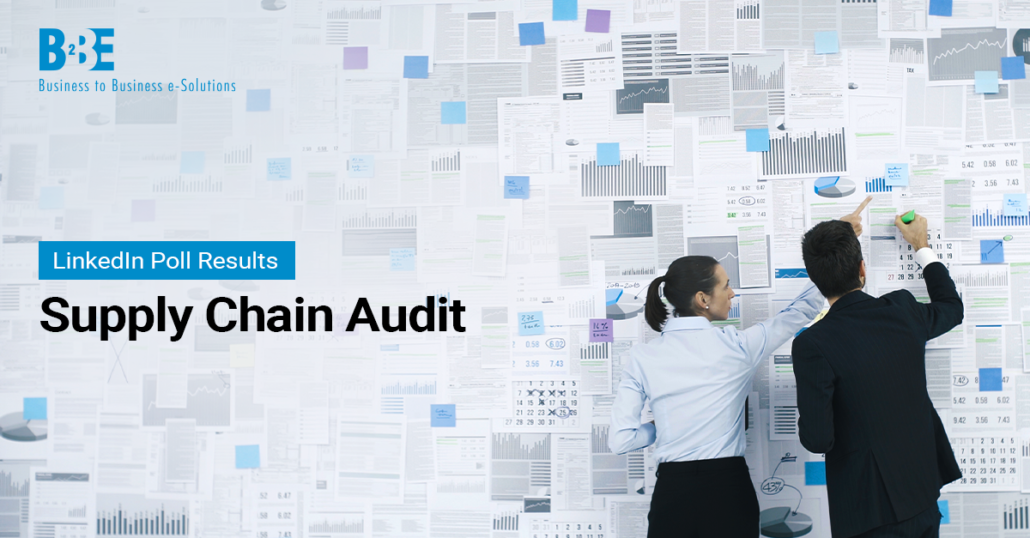A supply chain audit is an essential part of ensuring a company’s operations are running smoothly and efficiently. They provide valuable insights into a company’s supply chain processes and can help identify areas for improvement. However, it’s not always clear how often these audits should be conducted, or what level of value they provide. In this blog, we’ll explore the topic of supply chain audits and delve into the experiences and opinions of professionals who rely on them.
Poll results
In our most recent LinkedIn poll, we asked our social media followers: how often and how much value do you get from supply chain audits?
Supply chain audit: what we found
Regular audits, useful data
60% of respondents found regular supply chain audits provide useful data. This may be attributed to several factors. Firstly, a regular supply chain audits allow companies to identify inefficiencies, reduce costs, and ensure compliance with regulations. Informed decisions and improvements in supply chain processes are often the result of useful data. Additionally, audits help build trust and credibility with stakeholders, including customers, suppliers, and regulatory bodies. As a result, companies that conduct regular supply chain audits are often viewed as being more reliable and trustworthy. Finally, the increasing focus on supply chain sustainability and ethical sourcing may also be contributing to the value of regular supply chain audits. Particularly as these audits can help ensure compliance with environmental and social standards.
Regular audits, average data
20% of respondents found regular supply chain audits provide average data. Why is this? Firstly, it’s possible that the supply chain audit process requires adjustment. This is to ensure more valuable information is obtained. This may include revaluating the scope or objectives of the audit, or using different tools or methods to collect data. Additionally, companies may need to evaluate how they use the data collected from audits to drive decision-making and improvement. If the data obtained is not being used effectively, it may be perceived as less valuable. Finally, it’s possible that the results may be due to a lack of investment in the audit process. For example, not allocating enough time or resources to conduct thorough audits.
Regular audits, limited data
20% of respondents found regular supply chain audits to provide limited data. This may be attributed to several factors. Firstly, there may be a lack of clarity around the scope or objectives of the audit. This can result in limited data being collected. It’s important to clearly define the scope and objectives of the supply chain audit. This is to ensure the right data is collected. Additionally, the tools or methods used in the audit process may need to be revaluated to ensure that they are providing the most valuable information. If the data collected is limited, it may be necessary to use different tools or methods to gather more comprehensive information. Finally, it’s possible that there may be a lack of investment in the audit process, such as not allocating enough time or resources to conduct thorough audits.
We don’t audit enough
0% of respondents believe that their company does not audit enough. This could suggest that companies are recognising the importance of regular supply chain audits. This result may be attributed to several factors. Firstly, companies may be increasingly aware of the risks and challenges associated with complex and global supply chains, and the potential impact that issues within the supply chain can have on their business. As a result, companies may be more motivated to conduct regular audits to identify and mitigate these risks. Additionally, the increasing focus on supply chain sustainability and ethical sourcing may be driving the need for more frequent and thorough audits. Finally, there may be greater pressure from stakeholders, including customers, suppliers, and regulatory bodies, for companies to demonstrate transparency and accountability in their supply chain practices.
More information
B2BE’s experience in the supply chain sector allows our customers to build, expand and adapt successfully, enabling greater effectiveness. To engage with B2BE and offer feedback on what matters most to you and your business, make sure to follow us on LinkedIn and across social media. You can also vote in our latest LinkedIn poll. If you’d like to discuss your supply chain strategy, get in touch with us.
